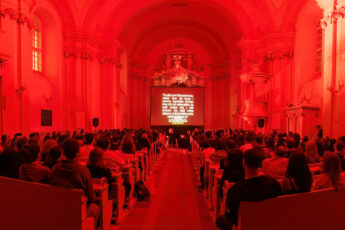
Over the past years, the biopic frenzy has expanded into ever-wider realms of subgenres. Presidents and politicians, artists and architects, military heroes and bureaucrats, sports and movie stars, scientists and intellectuals, civil rights activists and whistleblowers are populating our screens year in and year out. Many, if not all, of the recent biopics can best be categorized not so much by differences in style – few avoid hagiography – as by the career choice of their protagonists. The latest addition to the catalogue of job descriptions in the CV-obsessed world of biographical dramas is the entrepreneur. This year alone we can go and see Air (dir. Ben Affleck, 2023) on the co-founder of Nike Phil Knight and Air Jordan dealmaker Sonny Vaccaro; Tetris (dir. John S. Baird, 2023) on the inventors of the eponymous video game; Ferrari (dir. Michael Mann, 2023); Blackberry (dir. Matt Johnson, 2023); Spinning Gold (dir. Timothy Scott Bogart, 2023) on the record exec Neil Bogart; and, as if all that was not enough, Bezos: the Beginning (dir. Khoa Le, 2023)
There are now so many biopics about entrepreneurs that it is tempting to subgenre the subgenre. Particularly star-ridden are films about car manufacturers, tech-entrepreneurs, fashion houses and the sports industry. While Lamborghinis, Gucci dresses and the NBA seem to present a more obvious appeal to visual representation – after all, they all include elements of showbiz – the tech-entrepreneur is the odd-one out. What drives the success of such films as Jobs (dir. Joshua Michael Stern, 2013), Steve Jobs (dir. Danny Boyle, 2015), The Social Network (Fincher, 2010) or Bezos?
As economist Brad Delong recently observed, the US is now well into a Second Gilded Age. Comparing the wealth inequalities of today with the late 1800s, Delong observes that during the Gilded Age, the focus of productive capabilities shifted away from meeting the essential needs and conveniences of the majority of people. Instead, resources were primarily directed towards extravagant spending aimed at displaying social status and engaging in activities that have little value or purpose. Here are your films about Dior, Chanel, and Ferrari. The Gilded Age also saw the rise of the richest men in history. Dynastic families such as the Carnegies, Astors, Mellons, Rockefellers and du Ponts, were either founded or consolidated during that era. Inherited wealth played a significant part in driving the wedge between the rich and the poor, delaying political change or reform that could disrupt the existing social order.
Movies and popular culture were just about to exist during that time (early newsreels about the Rockefellers date from the Progressive era), but the written biographies on business and industry figures of the period may provide a fitting comparison to our cinematographic cult around tech moguls. In Constructing American Lives: Biography and Culture in Nineteenth-Century America (published by University of North Carolina Press in 1999), historian Scott E. Casper notes that biographers often portrayed people like Carnegie, Rockefeller and Vanderbilt in tales of rags-to-riches journeys, as “self-made men” who clawed their way up through sheer determination and cunning. In the narrative of these biographers, wealth was not a question of inheritance but of hard work, perseverance, and individual merit. By focusing on individual success stories, emphasizing philanthropy, and omitting societal controversies, such biographies thus contributed to the preservation of the status quo and helped sustain the existing power dynamics of the time.
It is not hard to see the parallels to today: the industrial philanthropist of the Gilded Age is the nerdy tech mogul of today, achieving success through exceptional vision, innovation, and risk-taking. It may be no coincidence that we are drawn to idealizing such stories during a time when the prospects for upward social mobility are poor. Films about extraordinary success that emphasize notions of hard work and determination, may reignite extinguished hopes in upward mobility. They are also a source of national pride. With populist beliefs in the tech sellout to China, concentrating on American ingenuity and entrepreneurship may help to patch up a broken collective identity.
For now, and in cinemas, the myth of the entrepreneur may still be a uniquely US American phenomenon. The only film about Europe’s richest businessman Bernard Arnault is a Michael-Moore-style documentary on the perils of globalized capitalism (Merci Patron!, dir. François Ruffin). In 2016, there was a two-part German TV series on the Adidas brothers and in 2014 Russia saw the production of Startup (dir. Roman Karimov, Evgeniy Tkachuk) about the founders of the search-engine Yandex. It is likely that European cinema will sooner or later catch on to the trend, probably with a focus on past glories. French cinema, criticism against Arnault’s luxury conglomerate of LVMH notwithstanding, already discovered the entrepreneurial spirit in fashion designers with (in some cases multiple) films about Yves Saint Laurent, Coco Chanel, and Christian Dior. Whether these types of films will spill over to Central, Eastern, and South-Eastern Europe remains to be seen. The most likely candidate would be Poland, where biopics are generally flourishing and entrepreneurs, today and in the past, are also not lacking.
During the Gilded Age, novelists like William Dean Howell parodied the carefully crafted image of industrial tycoons as self-made men and beacons of national pride. In his 1884 The Rise of Silas Lapham, about the title character’s rise to wealth in the mineral paint business, the description of Lapham’s life as an American success story is mocked by a journalist interviewing him in the opening pages of the book. “’Parents poor, of course’”, asks the journalist called Bartley. “‘Any barefoot business? Early deprivations of any kind, that would encourage the youthful reader to go and do likewise?’ […] said Bartley, with a smile of cynical good comradery.” It would be refreshing to see this kind of self-awareness portrayed in a movie. By now, there is ample material to parody.
***
This month, Jack Page completes his coverage of the 2023 Crossing Europe film festival in Linz with reviews of Giacomo Abbruzzese’s Disco Boy, which explores issues of identity and belonging, and of the thematically related Damian Kocur’s Bread and Salt about the racism of contemporary society as manifested in a small town. Antonis Lagarias spoke to Kocur at the Krakow Film Festival, and viewed Alexander Mihalkovich and Hanna Badziaka’s Motherland about the roots of military conscription in Belarus (and beyond) in Cluj, Romania. Finally, Anna Doyle reviewed Mihaela Drăgan’s The Future is a Safe Place Hidden in my Braids – a film built around the idea of Roma futurism – and spoke to its director about Roma culture and the fate of witchcraft in Romania.
We hope you enjoy our reads.
Konstanty Kuzma & Moritz Pfeifer
Editors




Leave a Comment